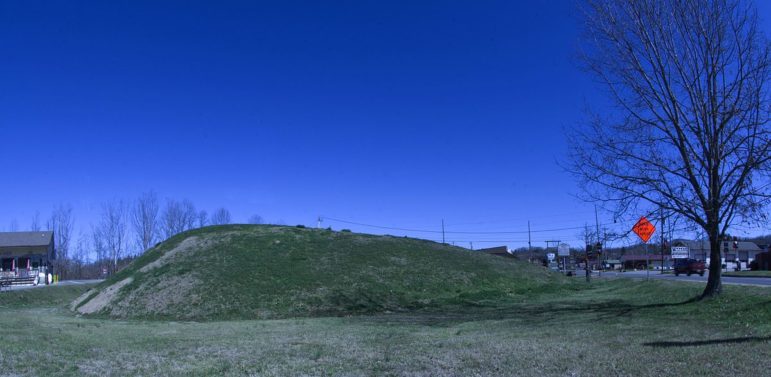ASHEVILLE, NC – Nikwasi (Nequasee) Indian Mound is one of some 50 ancient mounds found throughout the westernmost counties of North Carolina. The mounds are attributed to the Mississippian (800 C.E. – 1600 C.E.) and Woodland (500 B.C.E – 1000 C.E.) periods. Similar mounds can be found throughout the midwestern and southern states.

[Image credit: Matthew T. Bradley]
Nikwasi Mound is within the town of Franklin, North Carolina. It is not only in the town center physically but has also been at the center of a controversy over who should hold ownership and be responsible for maintenance.
The exact history of Nikwasi Mound is unclear; but it appears on maps dating back as far 1544. It also appears in British colonial records in 1718. The mound was included in a treaty between the Cherokee and early European settlers dating to 1727. Sometime around 1741, the treaty was broken resulting in the Cherokee losing possession of the land and the mound.
The Eastern Band of Cherokee Indians (EBCI) has long cited the spiritual significance of the Nikwasi mound as part of their ancestral heritage. EBCI are mostly descended from about 800 Cherokee who avoided the forced removal of tribal members to the west as part of the Trail of Tears. Today EBCI reservation, known as the Qualla Boundary, presents one the most complete and extensive American Indian collection displaying the history of the tribe at its Museum of the Cherokee Indian.

[Image credit: Warren LeMay]
Nikwasi Mound’s deed has been held by the town of Franklin since 1946 when the town’s residents raised enough money to purchase it. The deed was transferred to the town on October 10, 1946. This is likely to change very soon. Monday night the Franklin Town Council voted unanimously to transfer the deed of ownership to the Nikwasi Initiative, a nonprofit group comprised of the EBCI, the town of Franklin, Macon County, and Mainspring Conservation Trust.
Not everyone is happy about this decision. Several residents of the town of Franklin voiced their opposition to hand over the mound to the Nikwasi Initiative.
Betty Wallace a resident of Franklin said, “The Nikwasi mound is not yours to give away. It is ours for you to have and to hold in trust for us, and we beseech you to do your ethical duty.”
Another resident Melissa Callahan Hall expressed that she felt residents had not been well-informed about the proposal. She said, “We would just like more time. We would like them to prove themselves. We would like them to show that they are who they say, and what they’re gonna be, and that they’re not just a flash in the pan and they’re gonna be here before we sign something over.”
Five residents have already signed on to a lawsuit to stop the transfer of the deed that was filed in late March. Franklin Mayor Bob Scott was initially against the transfer of the deed, seeking instead to create a partnership that would bring various groups together while the town would still hold the deed to the mound. Monday night he voted in favor of transfer. While there has not been anything publicly stated as to why Scott changed his mind, a nonprofit holding the deed to the mound would enable the use of government and other grants—something the town of Franklin would be unable to apply for.
The Nikwasi Initiative, which was formed in April of 2015, has plans to create what they are calling a Cultural Corridor that will span more than 60 miles alongside of the Little Tennessee River running from Cherokee down to Franklin. The EBCI currently owns five mounds, Kituwah, Cowee, Nvnvyi, Birdtown, and Talulah. Nikwasi mound will bring that total to six.
In 2018 the group unveiled one of the first pieces of Cultural Corridor project. They installed a cultural kiosk overlooking Cowee Mound that provides panels of information on the ancient Cherokee town of Cowee. They have a similar plan for Nikwasi Mound.
In August of 2017, the Nikwasi Initiative acquired the 0.59 acre tract of land that sits adjacent to the mound. The land had a gas station on it that had been closed down for some time. There were community concerns that the abandoned station would eventually cause contamination of the groundwater and nearby river. The Nikwasi Initiative cleared the property of the building, debris, and underground tanks, turning it into a parking area for their offices, as well as for public use. The area also incorporates green space, as well as picnic tables.
One of the features of Cultural Corridor is that all of the signage will be written in Cherokee as well as English. The Cherokee were the first American Indian tribe to create a syllabary in 1821 and have their own written language. Today the EBCI has a number of language programs that promote the learning of the tribal language and seek to protect it from being lost since it listed as one of many indigenous languages that are endangered.
The future of Nikwasi Mound being placed in the hands of the descendants of those built it seems to reflect a path of cultural reclamation for indigenous peoples everywhere.
The Wild Hunt is not responsible for links to external content.
To join a conversation on this post:
Visit our The Wild Hunt subreddit! Point your favorite browser to https://www.reddit.com/r/The_Wild_Hunt_News/, then click “JOIN”. Make sure to click the bell, too, to be notified of new articles posted to our subreddit.
